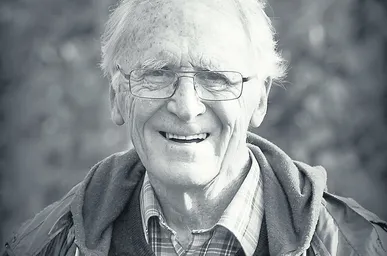
Evangelicalism in crisis
Ranald Macaulay
Date posted: 1 Jun 2018
Mary Davis interviews Ranald Macaulay for en
Ranald Macaulay studied Law at Cambridge University.

The opportunity of the crisis
Mary Davis
Date posted: 1 Jul 2018
This is the second instalment of an interview by Mary Davis for en with Ranald Macaulay
Last month, Ranald explained his deep concerns about evangelicalism: how Christianity seems totally implausible to our postmodern culture and how post-modernity’s effect is hugely accelerated by the Internet, social media and TV.
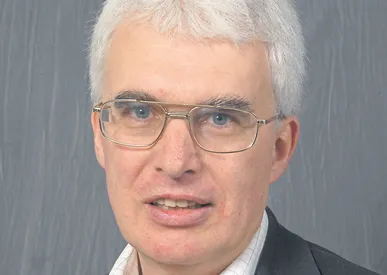
Undeniably mistaken!
Keith Fox
Date posted: 1 May 2017
Professor Keith Fox of Southampton University takes issue with the book Undeniable which Ranald Macaulay reviewed positively in en
In the opening paragraph of his review of Douglas Axe’s book Undeniable, Ranald Macaulay states that ‘evolution theory is no longer tenable and God’s creation is undeniable’ (en, October 2016).

Darwin undeniably discredited
Ranald Macaulay
Date posted: 1 Oct 2016
Ranald Macaulay introduces us to a very significant book
My admittedly dramatic title is deliberate.
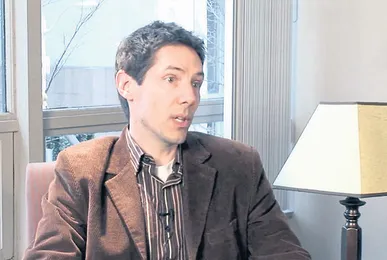
Undeniably true!
Douglas Axe
Date posted: 1 May 2017
Douglas Axe replies to Professor Fox’s criticisms
I’m grateful to Ranald Macaulay and to Keith Fox for taking the time to comment on my book.
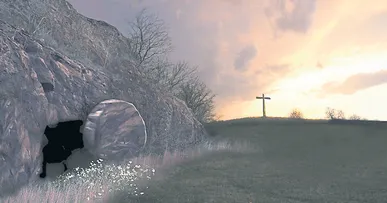
Lausanne & the polemical imperative
Ranald Macaulay
Date posted: 1 Mar 2016
Ranald Macaulay asks if the 1974 Congress missed something vital
When the Lausanne Congress opened in 1974 the global community was being treated to searing images of the Ethiopian famine.

Site seeing London’s Christianity
Peter Greyling
Date posted: 1 Jun 2015
As Christian Heritage opens a new centre in London, en interviews Peter Greyling about the work
en: Tell us about how the original vision for Christian Heritage Centres came about.
PG: In 1994 John Martin, a missionary who had retired from India to Cambridge, began giving guided walks of the city, using church history to tell the gospel to unbelievers and to stimulate believers. In due course the Round Church, Cambridge, became available and Ranald and Susan Macaulay founded Christian Heritage.

Intrinsic or extrinsic image?
Ranald Macaulay and Joe Martin indicate how theistic evolution tends to distort what it means to be human
Scholars have wrestled for many years to try to explain the familiar expression ‘the image of God’.
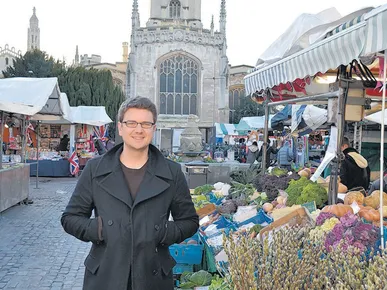
Christianity in the marketplace
David Illman was recently made co-director of Christian Heritage, Cambridge
Christian Heritage works to train Christians in communicating and defending the gospel.
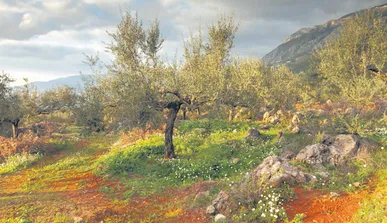
‘It is essential...’
Ranald Macaulay reminds us of what Lloyd-Jones and Schaeffer said about the scientific interpretation of Genesis 1-3
Three names dominated the UK’s evangelical landscape during the second half of the 20th century.
Reflecting on the Olympics
Ranald Macaulay
Date posted: 1 Oct 2008
A chill swept through me as I read Charles Moore’s recent article on the Beijing games1.
Media images of hard, cruel-faced bodyguards accompanying the Olympic torch around the world now slotted into place. ‘As the choice of Berlin for the Olympic Games in 1936 marked Hitler’s success and international acceptance, so the choice of Beijing for 2009 marks China’s’. In other words the global community was being treated to a massive con exercise. An emblem of peace masks a system of despotism.
Learning from Francis Schaeffer
Ranald Macaulay
Date posted: 1 Jan 2008
At the risk of oversimplification, Francis Schaeffer’s vision can be expressed in two fundamental concerns:
* True truth
* True spirituality
Born in the German town section of Philadelphia in 1912, as a young man he came in contact with the Christian faith in an almost unique way. During his late teens he happened to be reading classical philosophy. This showed him (a) that he had found the field of interest in which he felt most at home, ideas; and (b) that philosophy had no answers despite the fact that it dealt with what he called later ‘the basic philosophic questions’. Plenty of questions, but no answers!
Rescuing Darwin or wrecking the faith
Ranald Macaulay
Date posted: 1 Nov 2008
I was weaned from Darwinian evolution completely by surprise.
Converted my first weekend at university back in 1956 I found I had an immediate love of the Bible and a thirst to read more. At the same time I remained sceptical about origins. ‘Yes’ I said to my friend, ‘I do believe the Bible to be true, but don’t think I’m going to accept the Genesis myths uncritically!’ Like practically everyone today I had been raised to think that evolution was unquestionable — hence my problems about Adam and Eve.
Reaction and distraction
Ranald Macaulay
Date posted: 1 Jul 2008
When Marian Evans’s novel Adam Bede came out in 1859 it made the name ‘George Eliot’ justly famous.
Her novels soon took their place among the finest in the English language. To discerning readers, however, Marian’s scepticism indicated a growing problem about Christianity and the church.
Living in Sodom
Ranald Macaulay
Date posted: 1 Jun 2006
The fact that we find ourselves living in Sodom should come as no surprise.
Almost a century ago to the day (April 8 1906), Lytton Strachey of Trinity College, Cambridge, wrote to Maynard Keynes, the future economist, ‘We can’t be content with telling the truth — we must tell the whole truth: and the whole truth is the Devil… It’s madness for us to dream of making dowagers understand that feelings are good, when we say in the same breath that the best ones are sodomitical … our time will come a 100 years hence.’
As implausible as Father Christmas?
Ranald Macaulay
Date posted: 1 Dec 2006
The Bible emphasises that its truth is never readily accepted by the human heart.
It therefore prepares us not just for physical opposition but also for varying degrees of intellectual misunderstanding and even incredulity. When Paul addresses the Athenians, they object that he is bringing them ‘strange ideas’. The same would doubtless have been true had he been preaching in India or China, America or Egypt. Having said that, it is at least arguable that a new type of incomprehension has taken hold in Europe since the 18th century and that this new mindset is almost unique in history.
They believed God!
Ranald Macaulay
Date posted: 1 Mar 2005
Was it coincidence that brought Francis and Edith Schaeffer to their home in the Swiss Alps on an April Fools Day? Or was it another of God's subtle ironies pointing ahead to the essence of their future work?
Was God, in other words, as so often in history, choosing the foolish and weak things of the world to shame the wise and strong?
Jazz for Jesus
John Benton
Date posted: 1 Apr 2002
Bill Edgar is both a professor of apologetics at Westminster Theological Seminary in Philadelphia, and an extremely talented jazz musician who has spent a lot of his life in France. He is not only very intelligent and cosmopolitan, but uses his gifts to share the gospel in various ways. EN took the opportunity to interview him while he was in Britain earlier this year.
EN: Bill, tell us about your background?
BE: My parents met in North Carolina during the war, while Dad was in the army. That is where I was born. Shortly after, we moved to Paris, France, and I grew up there. Then we spent seven years in New York. But after that, the rest of Dad's professional career until he retired in 1983, was in Geneva. It was not a Christian home, but it was a wonderful home.
Evangelicals and socio-political involvement
Melvin Tinker
Date posted: 1 Jul 2000
During the 1960s and 70s, Western evangelicals spent much time discussing the relationship between social action and gospel proclamation, with major conferences held in Berlin (1966), Lausanne (1974) and Lausanne 2 in Manila (1989).
Some see such developments as a recovery of a vital element of authentic evangelicalism that was previously lost as an overreaction to the 'social gospel'. Other assessments are more negative, seeing a move away from full-blooded evangelicalism to a more liberal direction.
Who needs it?
Ranald Macaulay
Date posted: 1 Dec 1998
Despite the recent post-modernist revolt, Western culture still labours under much of the mythological residue left over from the Enlightenment. The axiom, for example, that religion is unimportant and irrelevant still survives.
Society should be redesigned along secular lines. Substitution of a materialistic for a religious worldview would leave morality unaffected and economic prosperity and political peace to thrive. It would simply be a case of being more practical - more tolerant, more progressive, less superstitious.
Theology and Mo/Po (modernism and post-modernism)
EN
Date posted: 1 Apr 1998
After a law degree at Cambridge, Ranald Macaulay went to Switzerland to help Francis Schaeffer in the work of L'Abri Fellowship. He later returned to the UK to do a theological degree at King's College, London, after which he and his wife, Susan, started a branch of L'Abri in Hampshire in 1971.
In 1977, he co-authored the book Being Human, recently re-published by Solway. He also founded and pastored two Presbyterian congregations in London and Hampshire. Since July 1997, he and his family have been living in Cambridge.
Inerrancy: summing up the debate
Mr Paul Gardner
Date posted: 1 May 1997
Since my article on Scripture last December, several others have joined the discussion. I was pleased that in the January issue, and then in more detail last month, Dr. Alister McGrath was kind enough to pursue the discussion.
He identified the 'crucial issue' as 'the extent to which evangelicalism has been affected by rationalism'. Certainly this matter must be faced and it is right that we all re-examine our own presuppositions. An approach that reduces Scripture to propositional form only is inadequate, as I previously argued, and probably reflects the influence of rationalism. Nevertheless, a careful reading of Warfield et al, shows that they did view Scripture in at least something of the more rounded way that Dr. Packer described (February).
Inerrancy - the larger discussion (Bulldog for March)
Ranald Macaulay
Date posted: 1 Mar 1997
Christianity has always recognised two basic 'impossibilities': the impossibility of unaided human salvation and the impossibility of unaided human knowledge. Paul says: 'no one will be declared righteous . . . by observing the law' and again, 'the world in its wisdom did not know God'.
As evangelicals we are familiar with the first, less with the second - which is serious not only for the inerrancy debate, but also for our whole experience, for the central issue of our time is not soteriology (salvation), important and necessary as that remains, but epistemology (knowledge). The West's current disorientation and distress flows naturally from its intellectual bankruptcy.
Penetrating public life - interview with Juraj Kusnierik
Malcolm Jones
Date posted: 1 Nov 1996
The Central European Foundation exists 'to make known the meaning and values of historical biblical Christianity in the cultures of Central Europe.'
Its desire is to enable, encourage and equip Christians throughout Central and Eastern Europe, by influencing Christians 'to think biblically about their worldview and encourage integration of faith and the whole of life.'